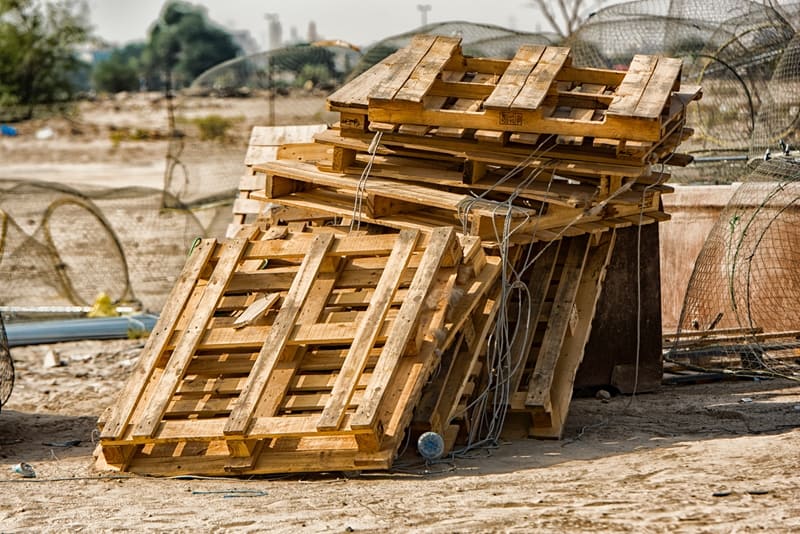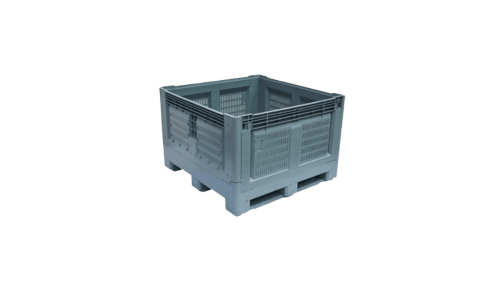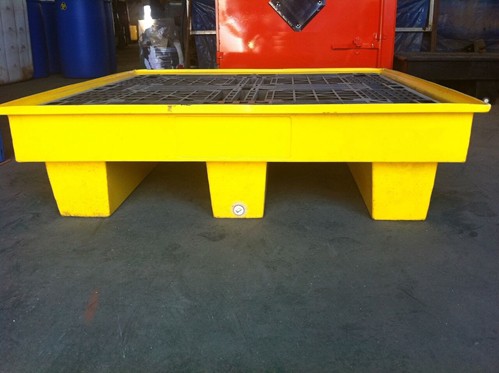Sanitation is an important consideration for manufactures and distributors, especially when transporting dangerous or vulnerable goods and materials, such as pharmaceuticals.
Choosing the right transportation materials, such as plastic pallets, can improve the conditions pharmaceuticals and similar materials are transported in not just from a regulations perspective, but from a sterility standpoint, too.


The growing need for fresh, temperature-controlled goods like pharmaceuticals will spike in coming years, with the global insulated shipping market expected to expand by 9.4 per cent between 2017-2026 according to Transparency Market Research.
This is compounded by the fact that 70 per cent of leading pharmaceutical products require temperature-controlled shipping (as of freight operators iContainers).
Businesses wanting to tap into this growing demand will need to be wary of the stringent health and safety regulations that govern the pharmaceutical industry. In shipping perishable medications, the overheads and cost of failure are high – so logistics managers need to know how to best ship their temperature-controlled goods.
70 percent of pharmaceutical products require temperature-controlled shipping
Eco Pallets offer a range of plastic pallets for the shipping and logistics sector – with plastic an excellent alternative to wooden pallets when it comes to shipping pharmaceuticals.
4 Advantages Of Using Plastic Pallets For Transporting Pharmaceuticals


Getting through customs as quickly as possible ensures that goods arrive at their destination in a timely manner. Delivery dates are crucial. With the transport of pharmaceuticals (as well as food industry products), most products have a defined lifespan.
Plastic pallets and crates minimise contamination issues that can be disastrous in such industries, helping to eliminate customs checks required with wood-based shipping materials.
1. Supply Levels
Reliable Delivery
In the pharmaceutical industry, the bar for failure is extremely low – so you need to make sure your operation is working to peak efficiency. If your wooden pallets become compromised, decontamination is a time consuming process that can imperil the quality of your goods and set you behind schedule.
Similarly, damage to your wooden pallets will also daily timely delivery. Picture the scene: you arrive at your goods’ destination and start to unload, only to find your wooden pallets have been cracked due to impact during transit. Your pharmaceutical goods have been spilled everywhere, and hygiene regulations stipulate these are now unusable.
A situation like this could cost your operations thousands in wasted stock and time – yet logistics operators still stick with wood. Plastic is robust on impact, with ‘give’ meaning it won’t splinter. It is your ticket towards a more reliable delivery chain.
The UK government’s warning around stockpiling reinforces the need to know the future requirements of the market. It can be difficult enough to meet sudden spikes in demand when it comes to the actual product.
And it is near impossible if shipping materials are below the required level. Eco Pallets Australia have distribution centres across Australia and can dispatch pallets from Sydney, Melbourne, Perth and Brisbane. And we deliver direct to major ports.
Warehouse and Storage Efficiency


A shipping pallet that is resistant to contamination and durable during transit is worth nothing if it is not designed for warehouse efficiency too. We have a huge range of plastic shipping pallets with a variety of characteristics, including:
- Stackable or nestable options;
- Access through either two or four entry points; and
- Different load limits and surface areas.
A durable shipping pallet resistant to contamination is worthless if it isn’t designed for warehouse efficiency too.
But despite our diverse catalogue, all our products are designed with warehouse efficiency in mind. Uniform in surface and size within a range for easy storage, their smooth surface also means they cannot cause injury to logistics workers or delivery people by splintering.
2. Hygiene Requirements
Ensuring Hygiene Standards
Plastic has a number of advantages over wood that make it better for an industry as focused on hygiene compliance as pharmaceutical shipping:
- Plastic isn’t porous like wood, so can’t absorb moisture or bacterial contaminants.
- Insects can lay eggs in wood, contributing to rotting pallets or damaging your pharmaceutical goods.
- Plastic can be far more easily cleaned and sanitised, keeping your operations compliant with pharmaceutical industry standards and biohazard laws worldwide.


Another big part of maintaining hygiene standards in pharmaceutical shipping is temperature control. Many perishable products are required to be shipped at extremely low temperatures, sometimes as low as -150 degrees celsius according to iContainers. While wood can be prone to warping in extremes of temperature (due to the expansion and contraction of trapped moisture), plastic remains durable no matter the extremes.
Cleaning and Disinfection
Plastic pallets are unable to harbour mould or moisture due to the sealed nature of the surfaces.
A real benefit to plastic pallet transporting of pharmaceutical products is that they’re immune to the type of contamination described above that so easily becomes an issue with wooden pallets.
Plastic pallets won’t harbour mould or moisture due to the smooth and sealed nature of the surfaces.
Easily cleaned and disinfected, with no risk of excess moisture, plastic pallets are suitable for use in areas where hygiene is paramount. Some pharmaceutical companies limit the use of pallets within their facility to plastic. Although goods may arrive on wood, they are transferred onto hygienic plastic to make cleaning and disinfection easier. The goods are only transferred back onto a wooden pallet when they have been suitably packaged to prevent contamination. As yet, the only instances of drugs having to be recalled due to contamination during the shipping process have involved the use of wooden pallets.
The risk of contamination issues associated with wooden shipping materials can be completely avoided with plastic pallets.
Crates and pallets must be easy to clean and disinfect. Plastic pallets are immune to infestation and are able to withstand pressure washing. We go as far as to provide a range of hygienic pallets specifically designed with smooth surfaces to enable quality cleaning.
Maintaining Hygiene
Plastic products do not absorb moisture, and dry easily and quickly when washed.
One of the top benefits of transporting pharmaceuticals with plastic pallets is their resistance to moisture, mould and mildew. Wooden pallets easily retain water during cleaning or if left outside in poor weather, encouraging mould and mildew growth. The presence of bacteria or excess moisture is a significant contributor to hygiene issues, and can contaminate products if present in any part of the packaging.
Plastic products do not absorb moisture, and dry easily and quickly when washed, removing any opportunity for bacterial growth.
With a much smoother surface than wood, plastic pallets also make dirt and debris much more visible and less likely to build up in small crevices. Spillages are easily wiped away and do not soak into the material, as they often do with wooden pallets.
Another issue with wood is the contamination risk associated with splinters and loose nails. Not only can these small items contaminate a product, they can also injure workers involved in manual handling, posing another threat to hygiene standards. Plastic pallets are made from a mould so there are no individual components that can break free, and they’re strong enough to withhold heavy loads without serious damage.


3. Temperature
Changing temperatures
Some drugs, as many as 7 in 10 according to icontainers, require temperature-controlled environments throughout the shipping process. They also report a change of as little as 2 degrees Celsius could render the drug useless and suggest that the pharmaceutical industry already loses around $150,000 every time a temperature issue occurs in a shipment considered as small. A change in temperature can ruin a pharmaceutical shipment.


Some plastic variations can withstand temperatures ranging from below freezing to 60 degrees Celsius. Wooden pallets can suffer in the low temperatures required for pharmaceutical shipping and are less heat and fire resistant than their plastic counterparts. Being able to withstand high temperatures also means that plastic pallets are able to be sanitised in methods involving high heat input.
A significant number of pharmaceutical products have very specific minimum and maximum temperature requirements which can be the difference between quality and ruined stock at the end destination. Plastic pallets are able to withstand temperatures as low as -30 degrees celsius which allows them to be used for a wide variety of products.
4. Global Customs
Regardless of country-specific shipping and trade agreements, a large number of countries also subscribe to a set of standards around wooden shipping materials.
All wooden crates or pallets must be certified as appropriately fumigated to prevent cross-country contamination of pests and other infestations. With some customs officers requiring supporting paperwork, it can be another delay in ensuring a shipment reaches its destination.
Gearing up shipping pharmaceuticals for the future
Sue Lee, global technical portfolio manager for World Courier, predicts a future in which the pharmaceutical and logistics industry develop together:
”It’s safe to say that as pharmaceutical products grow more diverse, supply-chain technologies must become more advanced to support individual needs.”
Sue Lee at World Courier
The Best Types Of Pallets For Shipping Pharmaceuticals
Over recent years, a number of well-known global pharmaceutical companies have lost millions of dollars due to hygiene issues with wooden pallets. Chemicals used to treat the wood were effected by moisture retention, creating another, more dangerous substance. Consumers reported mouldy odours and vomiting, leading a number of the organisations to recall products, as reported by International Pharmaceutical Industry.
Eco Pallets Plastic Pallet Range
Plastic pallets are immune to these types of contamination issues and are a reliable alternative for industries heavily reliant on hygiene.
View our Eco Pallet range here.
Spill Containment Pallets
In pharmaceutical shipping, it’s not just hygiene that can cause a health and safety nightmare. Spills also cause issues with contamination, product quality and cause a hazard for your workers. Unlike wooden pallets, their plastic counterparts come in a range of designs, capable of protecting your shipment no matter it’s size, shape or contents.
Spill containment pallets protect supply chain workers from accidents.
Spill containment or bunded pallets, are one such solution useful for transporting liquids. These products provide a tray underneath the platform to catch drips and spills as they happen, preventing liquid from spreading further. From a health and safety perspective, spill containment pallets protect supply chain workers from accidents as well as from encountering liquids best handled only by industry professionals.
Collapsible Crates
Another option is a fully collapsible plastic crate, which keeps your shipment entirely contained and eliminates the risk of products falling off the pallet during shipping. Most collapsible crates come with the option of a lid as well and fold down significantly when not in use, reducing return shipping costs.
Conclusion: Go With Plastic
Shipping pharmaceuticals requires strict hygiene control across the supply chain. Plastic Pallets are a key part of these pharmaceutical shipping operations. Organisations must ensure that the materials they use meet their standards.
In regards to Brexit discussions, the pharmaceutical industry is facing shipping complications as the UK government advises organisations to increase their stockpiles amid concerns around customs delays. The UK’s Secretary of State for Health and Social Care, Matt Hancock, sais that the UK will ensure a back supply of up to six weeks worth of medicines and recommends that pharmaceutical companies plan for additional stock levels, in a recent government letter.
Part of the worry is that treatment facilities and patients will not have access to the medicines they need in emergency situations, with that 2017 Manchester arena bombing cited as one incident where expedient international shipping was essential.
Plastic pallets meet this need much more effectively than wooden options. Made from a single piece of plastic, with no seams or joins, these pallets can be sanitised more easily and are overall a more hygienic pallet option than wood, according to Food Manufacturing Magazine.
At Eco Pallets, we offer a wide range of plastic shipping options for the pharmaceutical industry. Whether you know what you want, or need some friendly advice, our expert team are available to help. Contact Eco Pallets Australia today for more information and get your pharmaceutical shipping up to scratch.
Our advanced range of plastic shipping pallets will save you time and money, and ensure you stay industry-compliant. Tolerance for failure is low, so you need to ensure your shipping pallets are as worthy an investment as the rest of your operations.
Our team are dedicated to finding the right shipping materials for every business. Whether you need plastic crates or hygienic pallets, we’ll find a product that works.
To discuss what products suit your operations and to find out more information about why plastic pallets are the ideal transportation material, reach out to our team of pallet suppliers at Eco Pallets today.
Next Article: Key Challenges To Shipping Pharmaceuticals









Comments are closed.